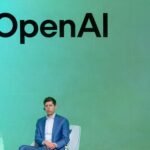A popular app from China has dropped the technical markets on Monday, fueled by fear that the United States may lose its precedence in artificial intelligence.
Nvidia shares fell by 16.9%, which contributed to a 1.5%drive in the S&P 500, while Tech Titans contributed to the Nasdaq composite index that drops 3.1%, the worst drop in more than a month.
The setbacks are attributed to an announcement by China-based DeepSeek that it has developed an AI model that can compete such as Chatgpt, Claude and twins at a fraction of the cost and the rise over the weekend of the free app of the enterprise to the top of the cards in Apple’s App Store in the US
“Deepseek gained popularity because it simply showed how good it is with the tasks that consumers care about,” says Hodan Omaraar, a senior AI policy analyst at the Center for Data -Innovationa thinking tank that studies the intersection of data, technology and public policy in Washington, DC
Hodan called out Deepsheek as an emerging star in a report she wrote in June. One of the most important points of the report was that the gap between the leading models of US industry leaders and those developed by China’s leading technical giants and new businesses quickly closed.
“While some may be surprised that Deepseek’s new model is competing on the English language tasks, the signs were that it was heading in that direction with the strength of his earlier models,” she told Technewsworld.
An ai -bargain shop
Mark N. Vena, President and Chief Analyst at SmartTech research In Las Vegas, the Deepseek app has recently risen in popularity due to the launch of advanced AI functions, such as real-time contextual insights and personal search recommendations, which make information faster and more precise.
“The new integrations with widely used productivity instruments also streamlined workflow and attracted professionals in the industries,” he told Technewsworld.
“Furthermore,” he continued, “recent updates that emphasized improved data security and privacy protection with users seeking reliable digital solutions.”
“It has the reputation that he is one of the best generative AI engines, but it is significantly cheaper to use than its competitors,” said Rob Enderle, President and Chief Analyst at the Enderle groupAn advisory service firm in Bend, ears.
“People like a bargain,” he told Technewsworld.
Willy Leichter, CMO of AppsocA provider of safety and vulnerability management in San Jose, California, agreed. “Any breakthrough that reduces the massive computer sources and costs of large -scale AI will be popular,” he told Technewsworld. “Lowering the cost of entry will benefit innovators, criminals and anyone else who uses AI on a budget.”
Curiosity can also contribute to the popularity of the app. “The ability to produce results comparable to Western AI giants using non-premium chips has attracted international interest,” said Ted Miracco, CEO of Approval Mobile Security, a global mobile application business.
“It is also possible that the interest in Chinese apps was put in the news through the Tiktok ban, red notes and other Chinese apps,” he told Technewsworld.
Questions about performance
Deepsheek raised a few eyebrows last week when he released his Deepseek R-1 model, which, according to Beats Openai’s latest O1 model, said on various benchmark tests.
“Here’s the rubbing and my biggest concern about DeepSeek,” Vena said. “The verification of Deepseek’s performance claims can be challenging due to limited transparency and possible restrictions on independent testing or auditing, especially as it works within the regulatory environment of China.”
“Concerns about access to own data and algorithms, as well as possible bias in published criteria, further complicate the validation process,” he added.
“In addition,” Vena continued, “geopolitical tension and distrust between nations may make the third-party authentication more difficult and raised questions about the credibility of his claims.”
Leichter noted that the verification of Deepseek’s claims and the comparisons of apples-to-apples will be difficult. “The shortcuts that these Chinese developers have found may have hidden defects, massive safety gaps or other issues we can’t expect yet,” he said.
“For people who are cheap, it may not matter, but large companies that build AI applications will need much more insurance that China is likely to provide,” he noted.
Miracco explained that the verification of Deepseek’s claims is challenging due to language barriers and limited transparency. “Chinese technical companies work under strict supervision of the government, which can prevent the release of unbiased benchmarks or third-party audits,” he said.
“We believe that the Chinese government has an interest in proving that sanctions in semiconductors and AI will be ineffective,” he added. ‘The release of Deepseek performance claims will undoubtedly support the narrative.’
Export controls’ disadvantage
Miracco has argued that Deepseek is trying to demonstrate that innovation can bypass hardware restrictions by optimization and ingenuity.
“It is intended to prove that export control alone is not sufficient to combat technological advances in adversary countries,” he said. “The US may have to ‘double’ on sanctions by focusing more on software-based regulations-such open source restriction partnerships, and to promote innovation to maintain the benefit, rather than only on limiting hardware- to limit export. “
However, Enderle counteracted that the restrictions on the execution of Chip implemented by the Biden Administration may have had unintended consequences. “Deepsheek shows that the blocks force China to promote its own technology faster and China seems to be even better than Japan was in reverse engineering or even stealing competitive technology,” he observed.
“The blocks have made US Tech a top national priority for China, and DeepSeek is just one of the worrying results,” he said.
Vena argued that Deepseek’s ability to achieve results comparable to the guidance of our AI firms using less advanced chips challenged the rationale behind export control.
“It demonstrates that the latest AI capabilities are not just dependent on the most advanced hardware,” he explained. “Consequently, limiting access to the top-level Nvidia products cannot fully prevent the development of competitive AI systems, which may undermine the effectiveness of such controls.”
“But” he added, “export controls can still serve a broader goal by delaying technological advances in competitive countries and preserving US leadership in the most sensitive and high performance AI applications.”
Democratization of the latest technology
Andrew Bolster, Senior R&D Driver at Black duck softwareA applications Security Company in Burlington, Mass., maintained that the release of Deepseeek unmistakably shows the tremendous potential of Open Source AI.
“By making such a powerful model available under an MIT license, it not only democratizes it to the latest technology, but also promotes innovation and collaboration in the global AI community,” he told Technewsworld.
DeepSeek’s rumors use of the opening chain of thinking data for the initial training has the importance of transparency and shared resources in promoting AI. In the context of ‘Open Source Ai’, it is extremely important that the underlying training and evaluation data are open, as well as the initial architecture and the resulting model weights. ‘
“The performance of DeepSeek in AI efficiency-to utilize a clever reinforcement-based multi-stage training approach, rather than the current tendency to use larger data sets for larger models-Dui on a future where AI is accessible above the billionaire classes, “He predicted.
“Open Source Ai, with its transparency and collective development, often exceeds alternatives with closed sources of adaptability and confidence,” he said. “As more organizations recognize these benefits, we can indeed see a significant shift to Open Source AI, which drives a new era of technological advances.”
Nevertheless, the markets may sell the existing AI ecosystem short. “I think the markets respond too much to the source of the innovation, as opposed to the innovation itself,” said Chirag Decate, Vice President analyst at GirlA research and advisory business in Stamford, Conn.
“That’s why it’s the strengthening of jingoist perceptions,” he told Technewsworld.
“It is also strengthening the perceptions that you do not need data centers, (and) you do not need GPUs if the underlying facts are the contrary,” he said. “To deliver AI on a scale, to create AI native societies of the future, you still need underlying infrastructure.”
+++++++++++++++++++
TechNewsUpdates
beewire.org












